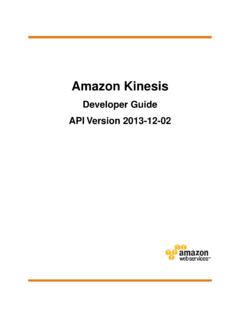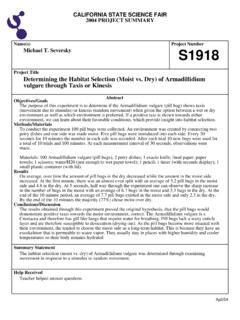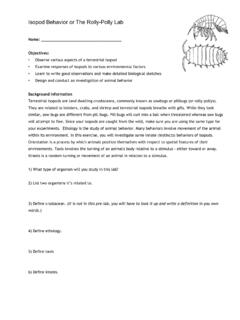Transcription of Mind Kinesis The Intelligent Investor - Investment In Stocks
1 Mind Kinesis ValueInvesting Notes Read less Learn More 1 ValueInvesting Notes | The Intelligent Investor Introduction: What This Books Expects to Accomplish Book only deal with that portion of their funds which they are prepared to place in marketable (or redeemable) securities bonds and stock Laymen s guide on the Adoption and Execution of an Investment Policy a. Minimize odds of suffering irreversible losses i. Graham constantly emphasizes importance of avoiding losses b. Maximize changes of achieving sustainable gains c. Develop polices which Investor will be comfortable (Psychology of Investor ) i. Main problem/Worst enemy: likely to be HIMSELF ii. Tendency to measure or quantify (whether the price cheap to buy or expensive to sell) Distinguished between Speculator and Investor NOT for those who trade in the market using technical approaches Underlying principles of sound Investment should not alter from decade to decade but application of these principle must be adapted to significant changes in the financial mechanisms and climate 2 types of Investor : Defensive and Enterprising Defensive/Passive Enterprising/Active/Aggressive Avoid serious mistake or losses Freedom from effort, annoyance and need for making frequent decisions Expect worthwhile reward for extra skill and effort Willingness to devote time and care to the selection of securities that are both sound and more attractive than the average Definition of Intelligent Investor (by Graham) o Nothing to do with IQ or SATS.
2 Is a trait more of character than the brain Being patient, disciplined and eager to learn Able to harness your emotions and think for yourself The Intelligent Investor By Benjamin Graham Mind Kinesis ValueInvesting Notes Read less Learn More 2 ValueInvesting Notes | The Intelligent Investor Common view that art of successful Investment 1. Choosing industries that are most likely to grow in future 2. Identifying the most promising companies in the chosen industries Problem It s not easy as it always look (based on past events); next sure thing most likely wrong in the end Era of air-transport Stocks in late 1940s and early 1950s Internet Stocks By the time, everyone decides the given industry the best to invest in: Stock price might be too high (future return can only go down) Lessons learn / Key notes Never succumb to the certainty that any industry will outperform all other in the future Obvious prospect for physical growth in business obvious profits for Investor Experts do not have dependable ways of selecting and concentrating on the most Art of Investment has 1 characteristic (not generally appreciated) Creditable (if unspectacular) result can be achieved by laymen with minimum effort and capability Reasons:- 1.
3 To improve this standard require much application and more than a trace of wisdom 2. May have done worse if just try to bring just a little extra knowledge and cleverness to bear upon your Investment program Main requirement limit to Investor on issues selling not far about their tangible-asset values Growth Companies Pros: Worth several times of net-assets Cons: Too dependent on the vagaries and fluctuations of the stock market Sound and Expanding Business Investor can consider himself as an owner in such companies acquired at a rational price (regardless of perception of stock market) Likely to work better Published stock-market predictions of the brokerage houses (strong evidence) that their calculated forecasts have been somewhat less reliable than the simple tossing of a coin. Market Risk Bull (stock price Rise) More Risky (Stock become more costly to buy) Bear (stock price Fall) Less Risky (Stock become cheaper to buy) Note: Investor in advanced stage of retirement may not outlast the bear market not sell stock (merely when stock price gone down) turn paper loss into real loss; deprive potential heir to inherit the stock at lower cost Mind Kinesis ValueInvesting Notes Read less Learn More 3 ValueInvesting Notes | The Intelligent Investor Chapter 1: Investment vs.
4 Speculation (and the Defensive vs. Enterprising Investor ) Investment Operation one which upon thorough analysis promises safety of principal and adequate return. Thorough Analysis Study of facts in light of established standard of safety and value Safety of Principal Protection again loss under normal or reasonably likely conditions or variations Adequate Return Rate/Amount of Return (no matter how low) that Investor willing to accept; provided he acts with reasonable intelligence Aspire to adequate not extraordinary performance Speculative - as long as the operation did not meet the above requirements. Investor recognize existence of speculative factor in common-stock keep within minor limit prepared financially and psychologically for adverse result (regardless of duration) Characteristic between Investor and Speculator Investor Speculator calculate what stock is worth based on the value of its business judge market price by established standards of value quotation value matter much less No interest in being temporarily right Invest only if comfortable owning a stock without knowing the daily share price Based standard of value upon market price.
5 Gambles that stock will go up in price because somebody else will pay even more for it Value incessant stream of stock quotes People who invest make money for themselves; People who speculate make money for their brokers Distinction between Investment and speculation is the disappearance on the cause for concern There are Intelligent speculation as there is Intelligent investing Intelligent Speculation Beneficial on 2 levels 1. Without speculation untested new companies would never be able to raise the necessary capital for expansion 2. Risk is exchange (never eliminated) whenever stock is bought or sold o Buyer (primary risk) stock price goes down o Seller (residual risk) stock price goes up Foremost points on Unintelligent Speculation Speculating when you think you are investing Speculating serious (instead of pastime when lacking proper knowledge and skill) Speculating more money than you can afford to lose Conservative view on speculating Non-professional who operate on margin; his broker s duty is to advise him Buy hot common-stock issue or purchase in similar way How to handle (It s fascinating) Put aside a portion (smaller the better of the capital in a separated fund) Never more than 10% of the asset in speculative account o Futile to suppress gambling instinct (most people) Must confine and restrain Never add more money into this account (due to bull market or gained profit).
6 Should consider taking out the money instead Never mix speculative and Investment operation in the same account nor in any part of your thinking o Never fool yourself into confusing speculation with Investment Mind Kinesis ValueInvesting Notes Read less Learn More 4 ValueInvesting Notes | The Intelligent Investor Ways which Investor and speculators tried to obtain better than average results Explanation Negative Points 1. Trading in the Market Buy Stocks (market advances) Sell Stocks (market decline) Short-selling (To benefit from market decline where price sold is higher than price they will be backing back) Not an operation which has thorough analysis that offer safety of principal and satisfactory return Short-selling (popular therefore overvalue issue test on one s courage and stamina as well as one s skill o Principle is sound and successful application is not impossible but not an easy art to master 2.)
7 Short-Term Selectivity (STS) buy Stocks which are report or expected to report increase earning or other favorable development is anticipated Stemming from human error o Wrong estimate of the future plans Nature of competition Current market price might already full reflect on the anticipation:- STS To the extent, next year result might be predicted and already taken into careful consideration Likely that other have done the same thing for the same reason LTS Possibility of outright error in prediction ( Airline/Internet bubbles) 3. Long-Term Selectivity (LTS) buy Stocks of companies o excellent record of past growth which is considered likely to continue in future or o not yet shown impressive results but expected to establish a high earning power later To able to enjoy reasonable chance for continued better than average result, must follow 2 policies:- 1. Inherently sound and promising 2.
8 Not popular on Wall Street. Reason on why such stock are available Speculative stock movement are carried too far in both direction Common stock maybe undervalue (lack of interest or unjustified popular prejudice) Large portion of the trading in common stock may not know the discrepancies between price and value o Intelligent person (Good head for figures) will be able to benefit other s foolishness Wide Group of Special Situation - bring annual return of 20% or better with minimum overall risk to people who knows the way around the field Intersecurity arbitrages, Liquidations (Pay-outs or Workouts), Protected hedges of certain kinds Typical Situations:- o Projected Merger or Acquisitions (offer higher value for certain shares compare to the price) Things to Note for such Special Situation Merger announcement may have obstacles to merge and deal might not go through Such trading no longer feasible or appropriate to most people o Only million-dollar trades are large enough to generate worthwhile profit Mind Kinesis ValueInvesting Notes Read less Learn More 5 ValueInvesting Notes | The Intelligent Investor Results Expected by Defensive Investor Recommend to divide his holdings between high-grade bonds and leading common Stocks Proportion in bonds and common Stocks (never less than 25% or more than 75%) Simplest choice (maintain 50-50 proportion) o Adjust to restore the equality when market development had disturbed it (changes of 5% or more) Alternative Policy o Reduce to 25% of stock (market dangerously high)
9 O Add to 75% of stock (decline in market; attractive stock price) 2 keys take-away based on examples in 1964, late 1971 and early 1972 1. Future of security prices is never predictable must learn how to predict and control one s behaviour. 2. Accelerating Inflation factor o Make stock equities preferable to bonds payable in fixed amount of dollars o Introduction of TIPS (Treasury Inflation-Protected Securities) in 1997 (Singapore does not have TIPS) TIPS rise in value when Consumer Price Index goes up (effective immunizing the Investor against losing money after inflation.) o Stocks are relatively poor hedge against losing money after inflation. Overall results not likely to be decisively different from one diversified or representative list than from another (more accurately that neither he nor his advisers could predict with certainty whatever differences would ultimately develop) Skeptical of the ability of defensive investors get better than average result Selection of important companies Long record of profitable operations Strong financial conditions 3 supplementary concepts or practices 1.
10 Purchase of shares of well-established Investment fund (Alternative to creating own common-stock portfolio) 2. Utilize 1 of the common trust funds or commingled funds operated by trust and banks (Got substantial fund able to use professional administration service) 3. Dollar-cost averaging (This method is application of broader approach known as formula investing ) Investor cannot hope for better than average result by buying new offerings (IPO) or hot issues of any sort. Results Expected by Enterprising Investor Expectation Attain better overall result than defensive companion Things to note Make sure the result will not be worse o Virtues (energy and knowledge) channel in wrong direction may become handicaps which might end up with losses instead. Essential Start with clear conception to which course of action offer reasonable chance of success and which do not Mind Kinesis ValueInvesting Notes Read less Learn More 6 ValueInvesting Notes | The Intelligent Investor Trendy Formulas that fall flat Method Outcome 1.









